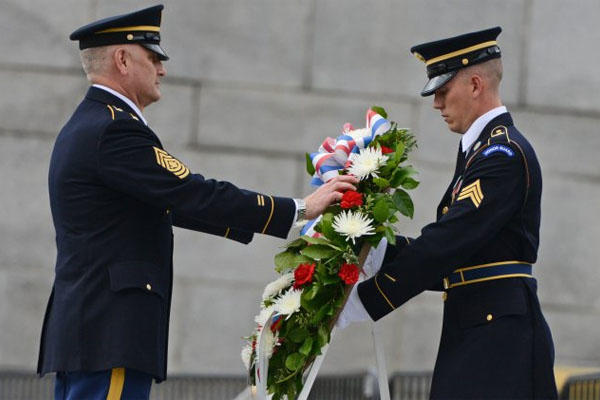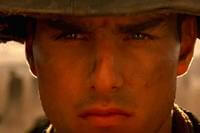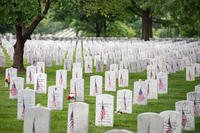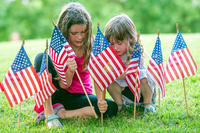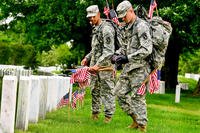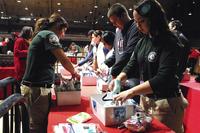The veterans of World War II "gave something of themselves to protect each and every one of us, to do what needed to be done -- the dirty work of war," said the Army's top enlisted Soldier.
"And it is dirty work," he continued. "It's tough, it's demanding. You've got to reach inside of yourself and find that place where you're going to go beyond what you believe is possible as a Soldier and as a human being."
Sgt. Maj. of the Army Raymond F. Chandler III was speaking at the Victory in Europe Day event at the World War II Memorial, May 8, in Washington, D.C. He also represented the Army during a joint wreath-laying ceremony, and as well as a special wreath to honor the survivors and victims of the Holocaust.
Chandler drew comparisons and contrasts between World War II-era veterans and those serving today.
At the start of World War II, thousands of young people chose to go to the recruiting stations to answer the nation's call, he said. After 9/11, many similarly volunteered.
When World War II Soldiers demobilized, "they went back to civilian life and did great things for our nation, which we see today," Chandler said. Likewise as the Army draws down, "I hope you'll welcome our young men and women back into our communities, because they've got a lot to offer as well."
As Soldiers transition to civilian life, they will receive transition assistance and Post 9/11 GI Bill benefits which are similar to what veterans received following World War II, Chandler said, thanking World War II veterans for showing the way ahead in honoring service.
When Chandler's wife, Jeanne, visited World War II-era spouses, they were amazed at the contrast between serving during World War II and today, he said. During World War II, Soldiers went off to war and then returned to their homes and families when it was over. Today, however, Soldiers "rotate in and out of theater on an almost annual basis."
Chandler described a staff sergeant he met recently who's been in the Army 12 years -- six of which he spent deployed. The staff sergeant is currently in Afghanistan.
Besides being far from home, wartime service has other negative effects besides the possibility of being killed or wounded, he said.
Unfortunately, veterans of World War II and Korea didn't receive help for their post-traumatic stress disorder, he said. "It wasn't talked about then."
Jeanne's uncle, who fought in the Pacific theater, is "even today affected by the combat, the casualties and the life or death situations he was put in," Chandler said.
Today, the Army and the other services are investing a lot of research into studying and treating post-traumatic stress disorder, known as PTSD, he said. "I think it's a great thing."
He encouraged veterans of every war who are suffering from PTSD to seek help.
WORLD WAR II STILL RELEVANT
Chandler said Soldiers today are still learning from veterans of "the greatest generation."
World War II is not forgotten by today's Soldiers, as it still has relevance, he said.
Throughout the Army, Soldiers in small groups and classrooms pour over the battles and tactics of World War II to learn what worked and what didn't work, he said. "So we don't make the same mistakes."
Another takeaway from World War II is the importance of the National Guard and Reserve. During World War II, Chandler said, the Reserve Components "performed superbly" after they were mobilized. Today's Reserve Components, after 12 years of war, have done just as well, he said. The active and Reserve Components working together make a formidable team.
Chandler said Soldiers today are able to learn from those who came before them.
"One of the most valuable lessons we can learn from the World War II veterans and other members of greatest generation, is sacrifice," he said, adding that today's Soldiers have sacrificed much.
"We also need to honor those volunteers who've chosen to go into harm's way, those young men and women 18 and 19 years of age who said, 'if not me, who?' and 'this we'll defend.' They are today's amazing individuals and they are the next greatest generation for our nation to honor as we do here today," Chandler said.
The sergeant major said that the day will eventually come when there won't be any more World War II veterans alive to honor, so Americans must always remember their sacrifices and the "many blessings we have today because of what they've done."
"One day this war in Afghanistan will also end," he continued. "And I challenge each of us to think: will we remember those veterans of today's conflict, as we honored those veterans who fought in Europe and the Pacific theaters? Will there be the same amount of energy and courage to say 'thank you' for so few who have given so much?"
Adding to Chandler's remark was another speaker at the event, retired Army Lt. Gen. Claude "Mick" Kicklighter, chairman, Friends of the National World War II Memorial.
"It's been said that any nation that forgets its veterans ceases to be a great nation," Kicklighter said. "This memorial says in a very special way that the American people and this nation will never forget our veterans, their families and especially those veterans who gave all their tomorrows. And when you're 18 or 19, all your tomorrows is a very high price to pay so that we can live in this strong, free and beautiful America."
